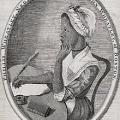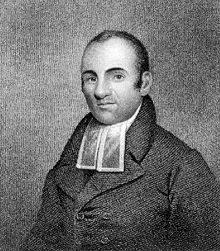34. New England Patriot: Lemuel Haynes
Preacher and Revolutionary War soldier Lemuel Haynes argues that the principles of the American Revolution demand the abolition of slavery.
Themes:
• R. Bogin, “‘Liberty Further Extended’: a 1776 Antislavery Manuscript by Lemuel Haynes,” William and Mary Quarterly 40 (1983), 85-105.
• R. Newman (ed.), Black Preacher to White America: The Collected Writings of Lemuel Haynes, 1774-1833 (Brooklyn: 1990).
---
• R.D. Brown, ""Not Only Extreme Poverty, but the Worst Kind of Orphanage": Lemuel Haynes and the Boundaries of Racial Tolerance on the Yankee Frontier, 1770-1820," The New England Quarterly 61 (1988): 502-18.
• T.M. Cooley, Sketches of the Life and Character of the Rev. Lemuel Haynes (New York: 1837).
• C. Jeffers, “Rights, Race, and the Beginnings of Modern Africana Philosophy,” in P.C. Taylor, L.M. Alcoff, and L. Anderson (eds), The Routledge Companion to the Philosophy of Race (New York: 2017), 127-39.
• K.P. Minkema and H.S. Stout, “The Edwardsean Tradition and the Antislavery Debate, 1740-1865,” Journal of American History 92 (2005), 47-74.
• R. Roberts, "Patriotism and Political Criticism: The Evolution of Political Consciousness in the Mind of a Black Revolutionary Soldier," Eighteenth-Century Studies 27 (1994): 569-88.
• J. Saillant, “Lemuel Haynes and the Revolutionary Origins of Black Theology, 1776-1801,” Religion and American Culture 2 (1992), 79-102.
• J. Saillant, Black Puritan, Black Republican: The Life and Thought of Lemuel Haynes, 1753–1833 (New York: 2003).
• M. Sinha, “To ‘Cast Just Obliquy’ on Oppressors: Black Radicalism in the Age of Revolution,” William and Mary Quarterly, ser. 3, 64 (2007), 149-60.







Comments
Carry over the topic from
Carry over the topic from Twitter ... the context issue that I had was I don't know how to evaluate Haynes' arguments for the abolition of slavery without understanding what allowed for people in Africa to be rounded up and sold as slaves in North America? When I look at how that kind of slavery worked in practice, I just can't get my head around how people thought it was OK.
In reply to Carry over the topic from by A Perry
Justifying slavery
Well, quite. It's obviously difficult for us really to understand what was going through the minds of slavetraders and slaveowners, but as we're seeing in the series there was already a long-standing practice of slavery e.g. early on with the Portugeuse, and what was really special about slavery in the period we're now looking at is the scale of it. I actually wondered whether we needed an episode just on slavery apologetics, but that will I think come out pretty clearly as we examine arguments given by the opponents of our Africana authors, and how they were refuted (a good example is the Baron de Vastey who is coming up soon and explicitly responds to slavery apologists). Typically the pro-slavery case was some combination of (a) the Africans are defective or subhuman and cannot take care of themselves, (b) they are supposedly well treated by their masters who are benevolent, (c) slavery is consistent with Christianity because slavery is mentioned in the Bible (and in antiquity, like the Romans) and the practice spreads the Word among the heathen Africans, (d) against the right of freedom for the Africans there is the sacred right of property ownership on the side of the masters, who cannot just be deprived of valuable belongings (in this case, the belongings are other humans) who are needed to make their plantations etc viable. You will probably get a better sense of this as we go along but I guess it will always be difficult for us to comprehend how these people could live with themselves.
Add new comment